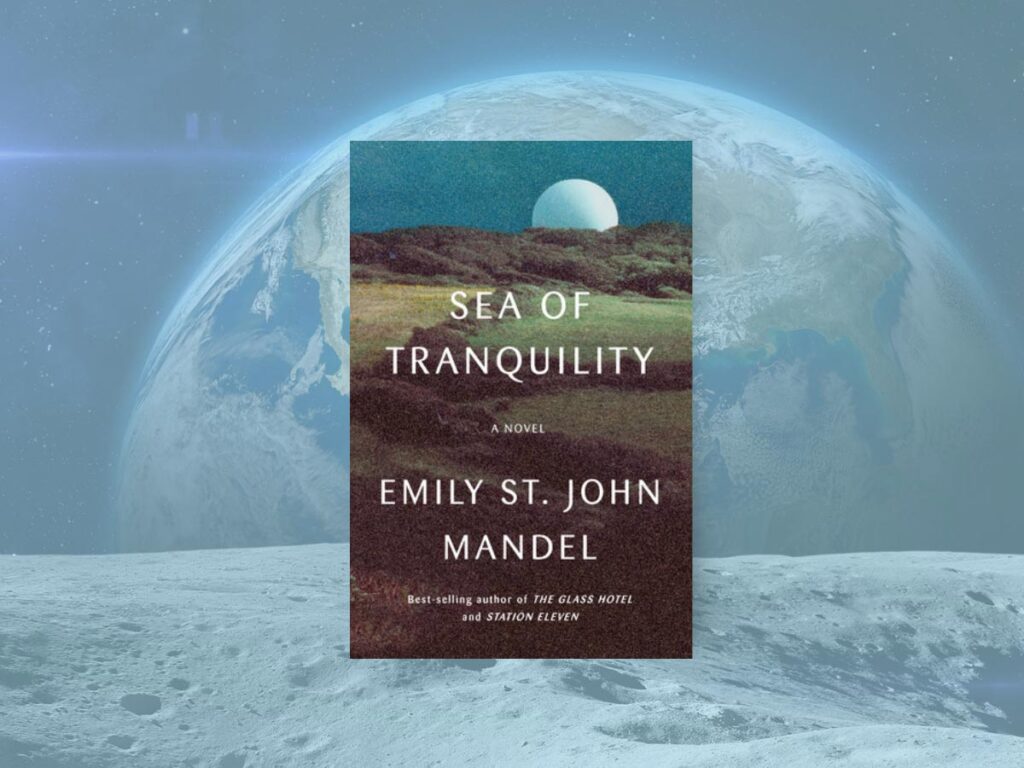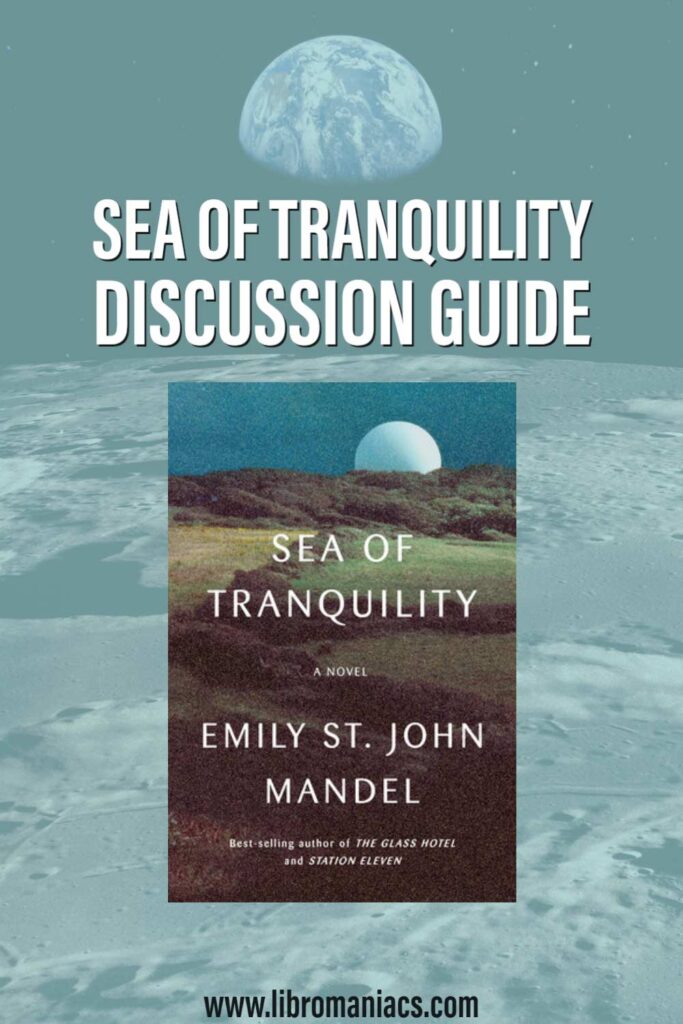One reviewer called Sea of Tranquility “a claustrophobic nautilus of a novel”. These characters are indeed hemmed in by time, pandemics, strict societal expectations, and the atmospheric domes above their heads. Gaspery’s time travel curls those threads in on themselves, creating one brain twister of a post-apocalyptic time travel book.
You may spend half of your book club time saying “what now?”. No worries, we’ll help you with that. Use our Sea of Tranquility book club questions to help your group begin uncurling the complicated themes and threads of the book.
This Sea of Tranquility discussion guide has a synopsis (does it accurately represent your experience of the book?), 10 question prompts, and snippets of thought-provoking reviews.
And we’ll even help you pick your next book with three related reads.

(This article contains affiliate links. This means that if you choose to purchase, I’ll make a small commission.)
Sea of Tranquility Synopsis
Sea of Tranquility, Emily St. John Mandel
Edwin St. Andrew is eighteen years old when he crosses the Atlantic by steamship, exiled from polite society following an ill-conceived diatribe at a dinner party. He enters the forest, spellbound by the beauty of the Canadian wilderness, and suddenly hears the notes of a violin echoing in an airship terminal—an experience that shocks him to his core.
Two centuries later a famous writer named Olive Llewellyn is on a book tour. She’s traveling all over Earth, but her home is the second moon colony, a place of white stone, spired towers, and artificial beauty. Within the text of Olive’s best-selling pandemic novel lies a strange passage: a man plays his violin for change in the echoing corridor of an airship terminal as the trees of a forest rise around him.
When Gaspery-Jacques Roberts, a detective in the black-skied Night City, is hired to investigate an anomaly in the North American wilderness, he uncovers a series of lives upended: The exiled son of an earl driven to madness, a writer trapped far from home as a pandemic ravages Earth, and a childhood friend from the Night City who, like Gaspery himself, has glimpsed the chance to do something extraordinary that will disrupt the timeline of the universe.
A virtuoso performance that is as human and tender as it is intellectually playful, Sea of Tranquility is a novel of time travel and metaphysics that precisely captures the reality of our current moment.
10 Sea of Tranquility Book Club Questions
These questions have been tailored to this book’s specific reading experience, but if you want more ideas, we also have an article with 101 generic book club questions.
- “A pensive silence falls over the group. These men are second sons, one and all. They are ill prepared for a working life and will inherit nothing.”
Edwin is a “remittance man”– a man of leisure, a man for whom there are low expectations. How does this make him ill-suited for the events that befall him? - On Olive’s book tour— “I was so confused by your book”, a woman in Dallas said. “There were all of these strands, narratively speaking, all these characters, and I was waiting for them to connect, but they didn’t ultimately.”
Some critics of Sea of Tranquility felt that same way. Do you think the characters hang together? Were they well developed? - In Olive’s narrative, 200 years into our future, there is still an expectation of more traditional gender roles. She is asked if her husband minds that she’s gone, and questions arise about how he is taking care of her child during the tour. Do you think that 200 years from now, women will still be fielding these sorts of questions?
- A pandemic features in all three timelines. In Olive’s book she writes, “Pandemics don’t approach like wars, with the distant thud of artillery growing louder every day and flashes of bombs on the horizon. They arrive in retrospect, essentially”
Does this feel true to your experience of the COVID pandemic? - Is this all about corrupted files? Are they living in a simulation? Or did Gaspery’s investigation truly warp the continuum? To that question, Gaspery says “so what?”. Do you agree with him?
- In one of her online presentations, Olive talks about theories that explain the popularity of post-apocalyptic literature: economic inequality, a longing for heroism, earthly catastrophes, etc. “When have we ever believed that the world wasn’t ending?”, she asks.
Why do you think that post-apocalyptic stories are so compelling? - The book covers centuries— how do things stay the same and how do they change?
- Colonization is an ongoing thread throughout the novel. How does it propel the narrative and how does its definition change (if at all)?
- Which character did you identify with the most? Who really captured you?
- “No star burns forever.” Is this ultimately an optimistic statement? Or a pessimistic one?
- BONUS QUESTION: “You should have told me my cat was a time traveler.” Are all cats time travelers? If yes, does this explain everything about them? We think yes!
Selected Reviews for Sea of Tranquility
“I really enjoyed it. There is this nostalgic quality to Mandel’s writing that made me feel like I was revisiting places I’d been long ago, even though I obviously hadn’t. I don’t know if all the pandemic subplots were strictly necessary and I think the author could have achieved the same goal without that being a recurring theme, but this is a small complaint.”
“The 2020 timeline overlaps with her previous novel, The Glass Hotel, and unfortunately the characters in the 2020 timeline of Sea of Tranquility spend about half of their dialogue recapping key plot points from The Glass Hotel. Also, the interconnections among the nested stories of Sea of Tranquility are made using a rather unconvincing time travel plot device, in contrast to the more subtle connections that David Mitchell provides in Cloud Atlas.”
“A claustrophobic nautilus of a novel. The summary touts this as a time travel story but to me, it seemed less interested in time travel and more in a novelist’s wistful musings on the harrowing transformation from *a writer, quiet observer of the world*, to *a writer, performing being a writer*— on what it means for her identity and time to be consumed as well as her novels.”
“…But what really threw me off was the almost complete lack of character development. None of these characters felt ‘real’ to me.”
3 Books Like Sea of Tranquility
If you like speculative fiction that deals with issues of death and life, then check out our discussion guides for The Midnight Library (what if you had made different life choices), The Measure (what if you knew when you were going to die), The Invisible Life of Addie LaRue (what if you made a deal with the devil and got an unnaturally long life), Cloud Cuckoo Land (what happens when a text endures over time and space), or The Unmaking of June Farrow (what if time travel was your family’s curse?).
There is a dystopic thread throughout this book and if you liked that, then try some of these climate fiction books. And if you just like hanging out in space, we’ve also got a list of books similar to Project Hail Mary by Andy Weir.

Cloud Atlas, David Mitchell
This book reads like a series of broken novellas, and like Sea of Tranquility, it spans a great deal of time. Each novella uses a different writing style, from an epistolary style, memoirs, to mysteries and dystopia. The novellas are held together as each story’s character reads the works from the preceding character.
It’s a great book if you are up for mind-bending, post-modern literary experiment.

The Sparrow, Mary Doria Russell
This is a great pick if you liked the outer space angle, unintended consequences and Gaspery’s humanity.
When a listening post in Puerto Rico picks up what sounds like singing coming from another planet, the world dithers. But a group of Jesuits see it as a sign from God and they put together their own space mission to investigate. The First Contact goes wrong and the lone Jesuit who returns is subjected to some pretty brutal consequences.
The book touches on faith, what it means to be “human”, and just how much damage can be done by well-meaning people. The story is richly imagined and absolutely heartbreaking.

Klara and the Sun, Kazuo Ishiguru
Honestly, any Ishiguru book would be a good fit here. Most of them deal with troublesome ethical dilemmas, displacement, dystopia, and/or destruction.
Klara and the Sun is a dystopian science fiction novel about Klara, a solar-powered Artificial Friend built to be sold as a children’s toy. Josie, a girl with an unspecified illness, takes Klara home to be her companion through her lonely years from adolescence until college. Klara herself narrates the story, which creates a contradictory perspective that mirrors the book’s layered and diverging concepts. She is keenly observant, and perceptive but also stiff and limited.
This book’s premise raises some pretty complex themes like: what is personhood, the nature of obsolescence, loneliness and love.
Read it for book club and use out Klara and the Sun guide.
Have a listen on Audible. Try audio books for free for 30 days.
Share these Sea of Tranquility book club questions with your friends:

